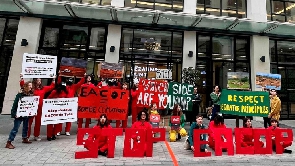 Activists protest against the financing of a controversial Eacop project in Africa
Activists protest against the financing of a controversial Eacop project in Africa
The politics of financing East Africa’s oil pipeline (Eacop) played out at the Brics Summit in South Africa as environmentalists used the gathering to re-protest the project; seen by authorities as an economic booster, but which critics say could damage the ecosystem.
This week, Chinese officials endured vitriol on the sidelines of the Summit in South Africa over Beijing’s support for fossil fuel projects in Africa.
Activists staged protests outside the venue in Sandton, to rile against the Asian country whose banks are expected to bankroll the controversial East African Crude Oil Pipeline (Eacop) from Uganda to Tanzania.
Local activists took to the streets to harangue Beijing to heed local and international voices and invest in “our collective renewable future” instead of supporting fossil fuel projects that will contribute to global warming.
“China is rapidly upscaling renewable energy projects at home but is funding #fossilfuels in Africa. This is what we’re against. We need the #Brics to adopt a new model and a new approach-based ion sustainability and transparency,” the #StopEacop campaign tweeted on Thursday.
The activists said the Chinese state's involvement in the fossil fuel projects in Africa is what they consider to be a friendship of destructive, exploitative and resource driven endeavours by Beijing, with Zaki Mamdoo, Coordinator of StopEacop campaign at 350.org equating China’s actions with colonialism.
“We cannot accept that China and other rising global powers are pursuing the same colonial extraction & exploitation of the last 400yrs. We demand a stop to all new fossil fuel projects in Africa & a just & equitable partnership model of collective benefit,” he tweeted.
350.org is one of the international non-governmental organisations that have mounted a fierce campaign against $5 billion Eacop – which is set to become the world’s longest heated pipeline – as a climate disaster that will fail Paris Agreement goals for the global economy to cut greenhouse gas emissions and limit temperatures to 1.5 °C.
TotalEnergies is the lead investor in the pipeline project, with 62 percent, while Uganda National Oil Company and Tanzania Petroleum Development Corporation own a 15 percent stake each, and China National Offshore Oil Corporation with 8 percent.
"However, with risk averse western lenders reducing their exposure to environmentally projects, including oil and gas projects, the project’s shareholders have increasingly looked to China as the source of financing to close the $1.8 billion funding shortfall," Uganda’s Energy Minister Ruth Nankabirwa said in May.
Government officials in Kampala have mentioned China Exim Bank and the Industrial and Commercial Bank of China (ICBC) as the likely sources of this funding, prompting activists to now direct their campaign against Beijing at the Brics as using its financial muscle to keep Africa hooked on its loans.
ICBC, South Africa based pan African lender Standard Bank (and its Uganda based subsidiary Stanbic Bank) and Japan’s Sumitomo Mitsui Banking Corporation (SMBC) are the transaction advisers for Eacop financing.
Officials in Kampala have said the bulk of the loans for the construction of the 1443km pipeline will come Chinese lenders, while African and Middle Eastern banks have also weighed in to finance a fraction of the project’s debt.
Eacop is financed 60 percent debt and 40 percent equity, with debt estimated at $2-3 billion, according to TotalEnergies shareholders meeting minutes for 2023.
In June, Standard Bank attracted protests outside its headquarters in Johannesburg as activists criticised the lender for its role in the controversial project after unconfirmed reports came through that ICBC moved an estimated $1-2 billion to Standard Bank, where it is shareholder, to capitalise the financier for purposes of lending to Eacop.
Kenny Fihla, Standard Bank’s Chief Executive of Standard Bank previously argued the lender may have little role in deciding whether the project goes on.
“In our view the involvement, or lack thereof of Standard Bank is material to the outcome of their [activists] own cause. And we have no problem with that,” he told SABC in June.